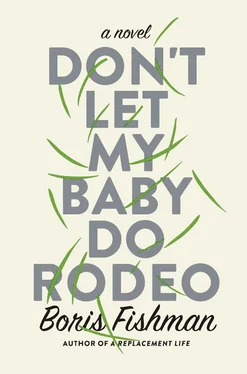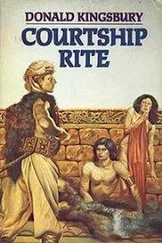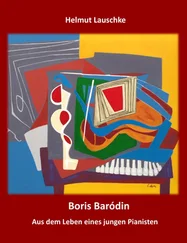“On three, we’ll walk away from each other,” Marion said. She had to shield her eyes from the sun to look at him. “A Western, but pacifist.”
“Sometimes I don’t know what you’re saying.”
“Will you be careful?” he said. “There’s weather on its way where you’re going. It doesn’t snow here the way it snows back home for you. It’ll put a foot down in an hour. Beautiful, but if you’re looking from your house and there’s a fireplace on.”
“It snowed from September to April where I grew up,” Maya said.
“Were you at seven thousand feet and did you drive through it?”
She dipped her head to say she understood. It was hard to imagine snow with the sun blazing the way that it was.
“Three,” he said. But she remained in place. Concealed from Alex by her back, she fit a hand around his and held it. “Three,” she said. Then she let go, turned, and replaced the expression on her face with another for her husband and son.
Alex watched her return. He and Max were seated on the same side of the picnic table, breakfasts started in front of them. “Everything all right?” Alex asked in his indirect way. She stared at him in disbelief. Did he prefer not to know? Was his desire for oblivion so strong? He had been more reproving the previous night.
“I had to give back his thermos,” Maya said, sitting down. She waited for Alex to ask how she’d come by it, but he didn’t. She began to scrape butter on toast. They sat in an uneasy silence, neither Alex nor Max touching their food, Max waiting for some kind of signal from his father. “Let’s eat, Maksik,” Alex said.
They chewed without looking up at each other. Now Maya filled with guilt; she was ruining the first flicker of enthusiasm from Alex and Max. Maya felt eyes at her back again, only now Marion’s. Then the singsong of his daughters, tent poles collapsing with a hollow ring, the tent scratching the ground as they folded it.
“Our plan is the same?” Alex said.
Maya looked at him questioningly.
“I am asking, we are continuing west?” he said.
“Why are you asking?” Maya said. “You don’t have to ask, you can answer as well.”
Alex breathed heavily and went back to his toast. A moment later, he gave up and threw it down, half-eaten, on the porcelain plate. The Escape had lumbered a set from New Jersey.
+
The Montana state line came and went without any of the ceremony that Maya expected on crossing into the fabled Montana. The word had worked a furrow in her mind until its overuse had rendered it free of association altogether, just a gurgitation of the Rubins’ astonishment, sorrow, confusion. Montana, Montana, Montana. Marion, Marion, Marion. Three, three, three.
She made Alex stop and reverse so they could pose for a timed photo of the state sign for Eugene and Raisa. The sign, its blue uncannily matched to the head-beating blue of the sky, was in the shape of the state. The circle at its heart divided, inversely, into snow-capped peaks rising above a lemony sun. But the sky was so general in every direction over the prairie they had been crossing, which was so flat it looked pressed with an iron, that she would not have been surprised to see the sun rolling along the fields rather than up in the heavens. When she piled out of the car, she nearly tipped over. Maya would mail the photo to Mishkin. Choke on it, Mishkin , she would write on the back.
Alex grumbled about reversing, but there wasn’t a vehicle in either direction; there had not been one in some time. They had trouble with the photograph. Their surroundings functioned on an abnormal scale. You could get the Rubins and nothing else, or you could get the landscape with the Rubins as specks. The Rubins gave up on the landscape and got little more than the sign, the result looking like they could be anywhere, only that the sign did say Montana.
The landscape ahead blurred and shimmered, so that now and again Maya balanced her gaze on the undemanding gray with which the Escape was upholstered. She lowered the window and the wind rushed in like surf haranguing a beach; she watched it swirling the endless umber wheat on either side of the car. There were sharp calls from ploverlike birds up above: dee-dee-dee, dee-dee-dee. They were tapping out a message to her, only she couldn’t decipher it. She thought of Marion. His recession with each mile felt inaccurate, false.
Once in a while, cutting the bleak sameness, a two- or even three-story home rose from the prairie, lifting Maya’s spirits: other people. The care with which the plot was maintained, the emerald lawn a rebuke to the bleached land all around — it was as tended as a lot in New Jersey — reassured her. She would look away, and, upon looking back, greet the home’s reappearance with a grateful surprise. She didn’t see any people. She watched mournfully as the sparse settlements disappeared past her shoulder. She craned to catch the last of them, willing some inhabitant to venture outside before the house dropped out of view.
About once per five of these homes appeared the loser in whatever game of survival was being played out here: a derelict home, the roof caved in, the windows broken, every shape that was once at right angles now off-center. The survival rate was 80 percent. She wondered why people lived in such barrenness. It made them frightening to her. She wanted to know the reason. It would be less frightening then.
The roadside was suddenly full of commemorative crosses twined with plastic flowers. One dead, two dead, then so many dead she couldn’t count all of them in the short time the Escape took to sail past. They had entered an Indian reservation. There were no walls or fences on it — perhaps because you could not fence this land adequately. She strained her eyes for evidence of the distinct kind of living that went on here, but nothing had changed from before: the dominion of wheat. What were a dozen Indians doing on this road all at once when she hadn’t seen a dozen drivers all day? Getting killed. The crosses grew out of the road’s meager shoulder like cattails. If you weren’t wheat and you wanted to grow here, you had to be a death-marking cross.
The state line had given her twenty minutes of distracting activity, backing up, photos, rechecking of Max’s seat belt, all wonderful. But now there was no escaping the landscape. The mountains had gone, correcting her expectation that there was no flat land in the West. She understood why the sky seemed so sovereign — nothing cleaved it. For some reason, peaks had been less frightening to her than all this flat nothing. First shock, and then pancaked by nothingness: It was not unlike adoptive mothering, the American West. The sun burned the prairie with summertime force; it was impossible to imagine the weather of which Marion had warned, though she enjoyed thinking of its threat because it was a reminder of him. All at once, she hated Montana, flat, featureless, and demonic, and wished instead for South Dakota, which felt familiar and settled, and also had Marion in it. If the rest of Montana was like this, she would understand very well why Laurel and Tim would have wanted to save their son from it. She tried, and failed, to keep her mind off Marion. She chewed on the cud of his name. She imagined living with him in one of the homes they passed. What did they do in those homes that remained standing and pretty, what correct choices had they made? And what had those who’d lived in the other homes done wrong?
She flicked on the radio, but there was only static. She turned the dial with infinitesimal slowness, but still nothing. She was dizzy. She turned to Alex and asked him to pull over so she could pee.
“Where?” he said.
She raised her hands in exasperation — up and down this prairie all of China could pee. “There.” She pointed to an unpaved turnoff, the roadway raised above the lip of a field. Beneath the slope, she could be private. Alex slowed down. “Not too far,” she admonished him as they turned off the main road. The side road was badly rutted; a rainstorm would have sunk anything but a tractor with balloon tires. A sign from the Montana Department of Agriculture said it was a winter wheat field, experimental because a seed specimen from North Dakota had been grafted with one from Montana. Maya had paid for the experiment with her taxes. Alex unlocked the doors.
Читать дальше












